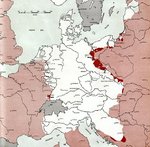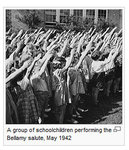Yamato
Legendary member
- Messages
- 9,840
- Likes
- 246
Last edited:
Le refus des louanges est un désir d'être loué deux fois.
The refusal of praise is only the wish to be praised twice.
The square was constructed between 1904 and 1908 and was named Reichskanzlerplatz. At the beginning the square was still without houses.
On 21 April 1933 the square was renamed Adolf-Hitler-Platz. According to plans for the „Welthauptstadt Germania“ by Adolf Hitler and Albert Speer the square was to have an important role at the western end of the east-west axis. It was also planned to rename the square after Benito Mussolini as Mussoliniplatz. On 31 July 1947 the square's name returned to Reichskanzlerplatz.
Six days after the death of the first Federal President of Germany, Theodor Heuss on 18 December 1963, the square was given its present name.
Am adolf hitler platz
Steht eine junge eiche
Sie strebt zur sonne auf
Von sturm und not
Sie ist uns vorbild
Treu und brav zu streiten
Für unser vaterland
Bis in den tod
Refrain
Hell erklinget deutscher sang
Unser ganzes leben lang
Treue frohe lieder
Klingen immer wieder
Durch die ganze welt
Am adolf hitler platz
Die junge deutsche eiche
Träumt von vergangenheit
Und neuer zeit
Sie träumt vom deutschen wald
Und seinem frieden
Und voller sehnsucht
Wird das herz ihr weich
Refrain:
Am adolf hitler platz
Die junge deutsche eiche
Sie werde frei und stark
Wie deutsches land
Von deutscher kraft
Und einheit soll sie zeugen
Den brüder reichen sich
Getreu die hand
Refrain
On Adolf Hitler Platz
is a young oak
it aims at the sun
of storm and stress
She is our role model
arguing faithfully
f? r our country
till death
Refrain:
Hell erklinget German song
our lives
Loyalty happy songs
sound again
|: Throughout the world: |
On Adolf Hitler Platz
the young German Oak
tr umt? of past
and new time
they tr umt? from German forest
and his peace
and full of longing
her heart is soft
Refrain:
On Adolf Hitler Platz
the young German Oak
they become free and strong
as German country
of German power
unit and they should bear witness
the Br? the shake
True to the hand
Refrain


Joachim Clemens Fest (8 December 1926 – 11 September 2006) was a German historian, journalist, critic and editor, best known for his writings and public commentary on Nazi Germany, including an important biography of Adolf Hitler and books about Albert Speer and the German Resistance. He was a leading figure in the debate among German historians about the Nazi period.
Fest was born in Berlin, the son of Johannes Fest, a conservative Roman Catholic and staunch anti-Nazi schoolteacher who was dismissed from his post when the Nazis came to power in 1933. In 1936, when Fest turned ten, his family refused to make him join the Hitler Youth, a step which could have had serious repercussions for the family, although membership did not become compulsory until 1939. As it was, Fest was expelled from his school, and then went to a Catholic boarding school in Freiburg im Breisgau in Baden, where he was able to avoid Hitler Youth service until he was 18.
The fact that his father, an "ordinary German" had understood the nature of the Nazi regime, and had resisted it, coloured Fest's view of his fellow Germans for the rest of his life. He never accepted that Germans had not known what Hitler was doing or that they could not have resisted the Nazi regime.
In December 1944, when he turned 18, Fest decided to enlist in the Wehrmacht, mainly to avoid being conscripted into the Waffen SS. His father opposed even this concession, saying that "one does not volunteer for Hitler's criminal war." His military service in World War II was brief and ended when he was made a prisoner of war in France.
Mein Kampf (Originaltitel: Den Blodiga tiden) ist ein Dokumentarfilm (Untergenre: Kompilationsfilm) über den Aufstieg Adolf Hitlers und die Diktatur des Nationalsozialismus zwischen 1933 und 1945 in Deutschland und – nach 1939 – weiteren während des Zweiten Weltkriegs vom NS-Regime besetzten Gebieten Europas. Der Film beschränkt sich nicht nur auf die Beschreibung des politisch wirksamen Machtsystems der deutschen Variante des Faschismus, sondern beschreibt auch dessen Vorgeschichte seit dem Ersten Weltkrieg.
Produziert wurde der zweistündige Film, der das Prädikat besonders wertvoll erhielt, im Jahr 1959 in Schweden vom deutsch-schwedischen Regisseur und Publizisten Erwin Leiser (* 1923; † 1996). Seine Dokumentation ist freigegeben ab 12 und empfohlen ab 14 Jahren. Am 25. April 1960 hatte der Film seine Uraufführung in Göteborg, wenige Monate später wurde er auch in Deutschland gezeigt.[1]
Mein Kampf (Original title: The Blodiga tides) is a documentary (Subgenre: compilation film) about the rise of Adolf Hitler and the dictatorship of the Nazis between 1933 and 1945 in Germany and - after 1939 - more occupied during the Second World War by the Nazi regime areas of Europe . The film is not limited to the description of the politically effective power system of the German variant of fascism, but also describes its history since the First World War.
(† 1996 * 1923) was produced the two-hour film, which is particularly valuable given the title in 1959 in Sweden by the German-Swedish director and publicist Erwin Leiser. Its documentation is released from 12 and recommended for 14 years. On 25 April 1960, the film had its world premiere in Gothenburg, a few months later, he was also shown in Germany. [1]
Erwin Leiser (May 16, 1923 – August 22, 1996)[1] was a German-born director, writer, and actor.
Born and raised in Berlin, he fled to Sweden at the age of 15 to escape the Nazi Party. He graduated from the University of Lund and worked as a journalist and a drama and literary critic.[2]
He is best known for his documentary Mein Kampf, based on Nazi footage from secret archives and depicting Nazi atrocities.[3] He subsequently made other documentaries both on Nazi Germany and other topics.
In 1967, he was a member of the jury at the Venice Film Festival.[1]
Sweden remained officially neutral during World War I and World War II, although its neutrality during World War II has been disputed.[57][58] Sweden was under German influence for much of the war, as ties to the rest of the world were cut off through blockades.[57] The Swedish government felt that it was in no position to openly contest Germany,[59] and therefore made some concessions.[60] Sweden also supplied steel and machined parts to Germany throughout the war. However, Sweden supported Norwegian resistance, and in 1943 helped rescue Danish Jews from deportation to concentration camps. Sweden also supported Finland in the Winter War and the Continuation War with volunteers and materiel.
Toward the end of the war, Sweden began to play a role in humanitarian efforts, and many refugees, among them many Jews from Nazi-occupied Europe, were saved partly because of the Swedish involvement in rescue missions at the internment camps and partly because Sweden served as a haven for refugees, primarily from the Nordic countries and the Baltic states.[59] The Swedish diplomat Raoul Wallenberg and his colleagues may have saved up to 100,000 Hungarian Jews.[61] Nevertheless, internal and external critics have argued that Sweden could have done more to resist the Nazi war effort, even if risking occupation.[59]
Cast (in credits order)
Adolf Hitler ...
Himself - Lauded by Hess, Physical Labour Speech to RAD, Behind Us Comes Germany Speech to HJ, We Created Our State Speech, Black Shadow Speech to SA, Reviews Parade, Two Principles Speech to Party
Rest of cast listed alphabetically:
Max Amann ...
Himself - Views Parade of SA in Long Pants, No Banners
Martin Bormann ...
Himself - Sits on Hitler's Left, at HJ Rally, Enters Hall Behind Hess, Sits Behind Streicher
Walter Buch ...
Himself - Views Parade of SA in Long Pants, No Banners, Views SS Parade
Walter Darré ...
Himself - Health of Our Farmers Speech
Otto Dietrich ...
Himself - Truth About Germany Speech
Sepp Dietrich ...
Himself - Commander of the SS-Leibstandarten
Hans Frank ...
Himself - Speech
Josef Goebbels ...
Himself - Arrives by Plane with Hitler, Bright Flame Speech, at HJ Rally, Views RAD Parade, Listens to Hitler
Jakob Grimminger ...
Blood Flag Bearer
Hermann Göring ...
Himself - Listens to Hess, Reviews Army, Parades in SA Uniform Then Joins Hitler, Listens to Hitler, Stands and Nods Agreement
Rudolf Hess ...
Himself - Opens Congress, You Are Germany Speech, at HJ Rally, Reviews Parade, Sits on Hitler's Right, Introduces Hitler, Listens to Hitler, Hitler Is Germany Speech
Reinhard Heydrich ...
Himself - Views SS Parade with Other Officers by Hitler's Car
Konstantin Hierl ...
Himself - National Labour Service Speech, Presents RAD to Hitler, Leads RAD Parade Then Joins Hitler
Heinrich Himmler ...
Himself - Walks to Flame with Hitler and Lutze, Leads SS at SA Rally, Leads SS Parade Then Joins Hitler, Sits Beside Lutze, Listens to Hitler
Robert Ley ...
Himself - Reviews DAF with Hitler, Single Thought Speech, Salutes SA Parade, Listens to Hitler with Schwarz
Viktor Lutze ...
Himself - Speech as New SA Leader, Walks to Flame with Hitler, Faithful to Führer Speech, Leads SA Parade Then Joins Hitler, Sits Between Himmler and Hess, Listens to Hitler
Ludwig Müller ...
Himself
Erich Raeder ...
Himself - Listens to Hess, Salutes SA Parade When Göring Sighted
Fritz Reinhardt ...
Himself - Improvements Speech
Alfred Rosenberg ...
Himself - Unshakeable Belief Speech
Hjalmar Schacht ...
Himself
Franz Xaver Schwarz ...
Himself - Sits Between Wagner and Himmler, Listens to Hitler with Ley
Julius Streicher ...
Himself - Stands with Hitler, Purity of Race Speech, Sits on Hitler's Left Near Podium, Nods in Agreement with Hitler
Fritz Todt ...
Himself - Autobahn Speech
Werner von Blomberg ...
Himself - Reviews Army Units with Hitler and Göring
Hans Georg von Friedeburg ...
Himself - Salutes SA Parade when Göring Sighted
Gerd von Rundstedt ...
Himself - Behind Raeder as He Salutes, Views Army Parade with Officers (unconfirmed)
Baldur von Schirach ...
Himself - in Car, Arrives at Stadium with Hitler, Selfless Youth Speech to HJ, Views SS Parade, Listens to Hitler
Adolf Wagner ...
Himself - Reads Hitler's Proclamation, Views Parade of SA in Short Pants, Sits Beside Schwarz, Listens to Hitler

Der Sieg des Glaubens (English: Victory of Faith) (1933) is the first propaganda film directed by Leni Riefenstahl. Her film recounts the Fifth Party Rally of the Nazi Party, which occurred in Nuremberg from 30 August to 3 September 1933.[1][dead link] The film is of great historic interest because it shows Adolf Hitler and Ernst Rohm on close and intimate terms, before Rohm was shot on the orders of Hitler on the Night of the Long Knives in July 1934. All copies of the film were apparently destroyed on Hitler's orders, until a copy turned up in the 1990s in the UK.
Cast (in alphabetical order)
Josef Goebbels ...
Himself
Hermann Göring ...
Himself
Rudolf Hess ...
Himself
Heinrich Himmler ...
Himself
Adolf Hitler ...
Himself
Robert Ley ...
Himself
Willy Liebel ...
Himself
Prince August Wilhelm ...
Himself
Ernst Röhm ...
Himself
Albert Speer ...
Himself
Margarete Speer ...
Herself
Julius Streicher ...
Himself
Franz von Epp ...
Himself
Franz von Papen ...
Himself
Baldur von Schirach ...
Himself
Generally not a good idea to hold the losers. Especially not when youre liquidating the winners after a margin call 😱.Wow, I've come to admit that all my trades, all the trades I recommended 4 months ago are going really really badly:
Gold, back at the levels where I bought it
Silver, same thing
Corn, much lower than where I bought it, about 1500 dollars per contract, and now I have 4 contracts on my back.
JPY, thousands of dollars lower than where I bought it (after having gone 4k into profit)
GBL, at breakeven (only short position)
Total disaster. It almost feels as if the markets were plotting against me to kick me out of these trades.
I've had margin calls, but no liquidations yet, as I am gradually dropping all the positions that made money: last week I dropped Natural Gas, and it went higher. Just now I dropped my CL (oil) contract, and hopefully it won't do the same thing that natural gas did.
I cannot believe how low all my remaining positions have been falling. There is definitely a plot against me.

...El 21 de enero de 1947, el juez Marshall Herro leyó la sentencia de muerte en la horca para Kabus, mientras que los demás miembros recibieron penas de prisión de hasta 30 años con trabajos forzados.
Ese mismo año los aliados intentaron frenar el descontento popular por los abusos de las tropas de ocupación. El Plan Marshall fue una de las iniciativas que llevaron adelante. Su objetivo era la reconstrucción de Alemania, lo cual logró apaciguar a un pueblo cansado después de largos años de guerra.
En 1948 se le conmutó la pena de muerte por cadena perpetua, por orden del gobernador militar estadounidense, Lucius Clay[1].
On the night of 3 January 1942, Hitler said of the origins of the salute:[25]
I made it the salute of the Party long after the Duce had adopted it. I'd read the description of the sitting of the Diet of Worms, in the course of which Luther was greeted with the German salute. It was to show him that he was not being confronted with arms, but with peaceful intentions. In the days of Frederick the Great, people still saluted with their hats, with pompous gestures. In the Middle Ages the serfs humbly doffed their bonnets, whilst the noblemen gave the German salute. It was in the Ratskeller at Bremen, about the year 1921, that I first saw this style of salute. It must be regarded as a survival of an ancient custom, which originally signified: "See, I have no weapon in my hand!" I introduced the salute into the Party at our first meeting in Weimar. The SS at once gave it a soldierly style. It's from that moment that our opponents honored us with the epithet "dogs of Fascists".
—Adolf Hitler, Hitler's Table Talk
The Bellamy salute is the salute described by Francis Bellamy to accompany the American Pledge of Allegiance, which he had authored. During the period when it was used with the Pledge of Allegiance, it was sometimes known as the "flag salute". During the 1920s and 1930s, Italian fascists and Nazis adopted a salute which had the same form, resulting in controversy over the use of the Bellamy salute in the United States. It was officially replaced by the hand-over-heart salute when Congress amended the Flag Code on December 22, 1942.

harsh measures: death sentence, reprisals... shelling the villages... 13 soldiers shot in reprisal for one US dead... even worse than what the germans had done.
Yet no one is told this history, because the winners are always right.
Rome, Open City was definitely a masterpiece, so good that it was painful to watch, and in fact I never watch... i never watched it entirely... I never watched it in its entirety.Germany Year Zero (Italian: Germania anno zero, German: Deutschland im Jahre Null) is a 1948 film directed by Roberto Rossellini, and is the final film in Rossellini's unofficial war film trilogy, following Rome, Open City and Paisà. Germany Year Zero takes place in post-war Germany, unlike the others, which take place in German-occupied Rome and during the Allied invasion of Italy, respectively.
As in many neorealist films, Rossellini used mainly local, non-professional actors. He filmed on locations in Berlin and intended to convey the reality in Germany the year after its near total destruction in World War II. It contains dramatic images of bombed out Berlin and of the human struggle for survival following the destruction of the Third Reich. When explaining his ideas about realism in an interview, he said, "realism is nothing other than the artistic form of truth."
Yes, I see your points. Thanks for the feedback.
...
Die Deutsche Wochenschau 18.Januar 1945
it would seem that everything is going fine...
...instead this is the situation:
http://en.wikipedia.org/wiki/File:1945-02-15GerWW2BattlefrontAtlas.jpg
View attachment 168764
from:
http://en.wikipedia.org/wiki/Timeline_of_World_War_II_(1945)#February_1945
